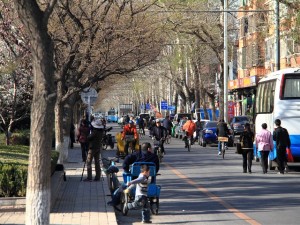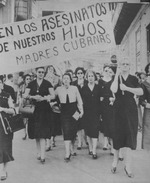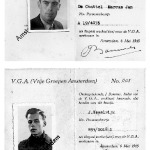Verah Okeyo ~ Low-Cost Housing Seen As Answer To Urban Housing Problems
In 2011, the UN-Habitat estimated that African cities will become home to over 40,000 people and the shortage of housing an unattainable dream for most households.
With an urban population growth at 4.2 per cent annually, Nairobi alone requires at least 120,000 new housing units annually to meet demand, yet only 35,000 homes are built, leaving the housing deficit growing by 85,000 units every year.
Coupled with the acute shortages, is the rising number of issues that any aspiring homeowner or institution seeking to set up facilities has to confront: HassConsult Real Estate’s 2015 report indicated a steep climb in land prices and ownership processes in Nairobi.
Read more: http://www.nation.co.ke/Low-cost-housing
To Be A Man Is Not Easy ~ Stories From Ghanaian Emigrants. Contents & Introduction
Introduction – see below
1. The good samaritan who follows where the money is. Interview with Owusu Agyeman
2. Dollars in the wall. Interview with Mr. Babbs Haruna from Nkoranza
3. A scar reminds me of the day I wept. Interview with Kwame Baffo
4. My hotel! Interview with Michael Sarpong
5. The boys of the band. Interview with Akosua Asantewaah
6. Peace of mind or success? I want it both. Interview with Kojo Apiah Kubi. (Brian Osanhene Duako in Chicago)
7. It is love for one another that makes us continue. Interview with Kojo Sampson
8. I saw dead people covered in dust. passport on top. Interview with Mr. Darko from Nkoranza
9. No other treats than daily fresh insults. Interview with Yaw Charles from Nkoranza
10. I want to get a life but I cant because I am waiting. Interview with Richard Kwasi Ntim
11. Mercy, the girl with the red leggings
12. Education, solidarity and being able to say no. Interview with Matthew Essieh
13. Caught between two worlds. Interview with Samuel Oteng
14. The conference participant. Interview with Osei Takyi
Introduction
Why this book? It all started with Kwame Baffoe, the guy who only wept once. Kwame was the hospital driver at the time that I worked as a tropical doctor at Nkoranza Hospital. One day Baffoe disappeared. After two weeks his relatives came to ask for his end of service benefit. I was then the medical director as well as the administrator and I had to say No, he vacated his post so sorry, no. But where for God’s sake is Baffoe? They silently left. This was in the mid-eighties. Read more
To Be A Man Is Not Easy ~ The Good Samaritan Who Follows Where The Money Is. Interview With Owusu Agyeman
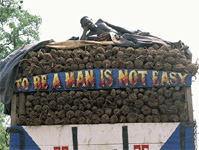 I am Owusu Agyeman and I come from from Akropong in the Nkoranza district. I live here in Nkoranza town where I have my well known Ash-foam business. I sell pillows and mattresses. As you may know, my father is a chief.
I am Owusu Agyeman and I come from from Akropong in the Nkoranza district. I live here in Nkoranza town where I have my well known Ash-foam business. I sell pillows and mattresses. As you may know, my father is a chief.
I decided to go to Libya because there is no work in Ghana. Let me correct myself and say it this way: there is work in Ghana but it doesn’t fetch any money. Take farming for example. I may use two million Cedis to prepare and sow the land and when I harvest my corn I may get 1,5 million in return. What does it mean? It means I lost. I have lost money because the market prices are bad. That is why I went abroad, to get enough money to start a business in Ghana.
At the time when I left Ghana I was no longer a young boy, I was thirty eight years old and had a wife and three children. My wife agreed that I should go in order to provide for the family. So then we had to prepare for such a journey which is both costly and dangerous. Danger is everywhere along the way but the walking, which we call footing, through the desert, that is the greatest risk! I will tell you the story of my journey. I started here in Nkoranza in Ghana and traveled in an ordinary lorry to the border at Bawku.
I then took a car across the border to Burkino Faso and then on to Mali. Finally I went deep into Niger where you reach the desert and then another chapter starts! Those days when I traveled there, there was no such thing as group transport with Ghanaians all the way to Libya. Not at that time. Now that has changed.
Africans need no visa on the West-African continent so I had all I needed which was my passport, my vaccination card and enough money. The last one is the hardest! At border crossings I of course never tell my real plans of going to Libya for they would send me right back. So at the Ghana border I say I go to Burkina Faso to work and from Burkina Faso I say I go to work at Mali. I have a profession. I am a mechanic. So that’s what I say: I am going to work there as a mechanic. Once in Mali they ask me where I am going and I say to Niamey in Niger. I went to Niamey and then to the second biggest city which is called Agadez. I did all this with ordinary local passenger cars. It is at Agadez that the story changes!
Here you have reached the desert. Here we sit and rest along the roadside and we wait. We wait for other people who are on their way to Libya. Once there are enough people to fill a car then you go across the desert. The cars are land-cruisers, pick-ups.
Niger is a poorer country than Ghana, no jobs. There are men there in Agadez who make a living out of assembling people and organizing a car for them. There are other men who make it their job to cross the desert with us and bring us to Libya. Two of these men sit in the cabin in front and all of us travelers are packed in the back of the pickup. In my case they took us, 90 to 100 persons, into two cars. At that time, 1997, they let us pay 20,000 CFA, which is about 50 dollar per person. We were packed like maize bags, sometimes they even got more than 50 people in one land-cruiser. Read more
The Postman Only Had To Ring Once
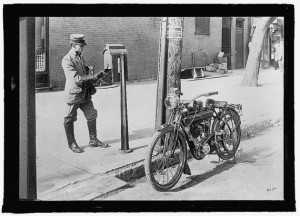 What a beautiful public love letter to an art that appears to be lost, but not quite. This writer, sharing his thoughts with who knows who, also longs for the intimacy of the exchange of words between two. What strikes me most about this essay are the words: “The day I lost one of J.’s illustrated postcards in the subway on my way home, I was as distraught as I would be now if my hard disk crashed.”
What a beautiful public love letter to an art that appears to be lost, but not quite. This writer, sharing his thoughts with who knows who, also longs for the intimacy of the exchange of words between two. What strikes me most about this essay are the words: “The day I lost one of J.’s illustrated postcards in the subway on my way home, I was as distraught as I would be now if my hard disk crashed.”
No, I would not say like “my hard disk” crashing. Not that at all. That least of all. That is an anxiety unique to this age of data-exchange, the reduction of all words, whether committed to hard-drive with care or hastily-strung-together, to an assemblage of giga-bytes. That feeling is equivalent to the boss berating you for losing an “important document”, no matter how important to you this hard-drive may be.
I have kept letters that are close to my heart, letters that mark milestones in my life and recollect those in the lives of those for whom I care, those who I remember, whether or not they remember me. I have lost some of these, in the jumble of our “modern” state of statelessness, placelessness. With each loss I knew I had lost a marker. Not that the object itself was a loss it itself. It was a loss because it has meaning in and of itself. The words, which were written with care and thought, sometimes in friendship, at times in love, are irreplaceable in a way that a hard-drive could never be. Letters brought more than news, or, rather, they defined a notion of news that many no longer regard as relevant. The postman only had to ring once.
Dropping these fragments in the subway would mean losing a piece of the dialogue that once existed, a fragment that could not have been spoken in words, and which cannot ever be committed to memory in the way that we can store passwords to social media sites, the literary equivalent of fifty shades of grey. Not even the spoken word can “reveal” itself in the immediacy of dialogue. We need to filter the maelstrom of spoken intonations, throw away thoughts, carelessly aimed barbs, fluff. In other words, we need to “process”, in the pseudo lingo of the day, as if the spoken word is something to receive like a legal brief, rather than to share in a collective act of interpretation.
So perhaps it is not only the written word that is fading, the medium for committing our most intimate thoughts. With that loss we risk losing the art of listening, rather than merely hearing as one does in a noisy room. We have turned listening into hearing, the ear into a portal to matter, and that extraordinary matter into a measurement of our relative sanity. Who has not heard the claim that we use perhaps 12-15% of our brains, “on average”? What better measure of our language of median lines. In this age of brain science thought, itself is losing its tragic quality, as we learn that the biological organ with which we think is also the locus of our deepest emotions, and we again take refuge in “spirit” to quell a fear inspired by our eternal finitude. Hang onto those letters and postcards. The brain has a sell-by date. The words it shapes into a personal declaration between two people do not.
About the author
Prof.dr. Anthony Court – Researcher, Genocide Studies, University of South Africa
sustainablecitiescollective ~ Four Lessons From Beijing And Shanghai Show How China’s Cities Can Curb Car Congestion
Although Beijing, China has struggled in previous years to adopt strong transport demand management (TDM) strategies, the city is now looking to expand its TDM policies to combat growing car ownership.
A century of car-centric urban development has left our cities polluted, congested and searching for sustainable solutions. Transport Demand Management (TDM) strategies can provide these solutions by combining public policy and private sector innovation to reverse over-reliance on private cars. The Moving Beyond Cars series—exclusive to TheCityFix and WRI Insights—offers a global tour of TDM solutions in Brazil, China, India and Mexico, providing lessons in how cities can curb car culture to make sustainable transport a reality.
As China’s GDP has grown, so has the number of cars on its roads. From 2008 to 2010, the country’s vehicle ownership almost doubled, from 38 vehicles to 58 per 1,000 people, and is set to hit 269 vehicles by 2030. This growth in car ownership not only means that the auto industry and infrastructure investments will continue booming, it also means more air pollution, energy consumption and traffic crashes.
Read more: http://sustainablecitiescollective.com/car-congestion
dLOC ~ Digital Library Of The Caribbean
The Digital Library of the Caribbean (dLOC) is a cooperative digital library for resources from and about the Caribbean and circum-Caribbean. dLOC provides access to digitized versions of Caribbean cultural, historical and research materials currently held in archives, libraries, and private collections.
Read the dLOC Fact Sheet (and more about dLOC), see the dLOC partners, read about dLOC’s Protecting Haitian Patrimony Initiative, or Register for a free mydLOC user account. Please contact us with any questions.
dLOC is developing a collaborative funding model. Support dLOC financially by becoming an institutional member or a personal member.
Go to: http://www.dloc.com/



